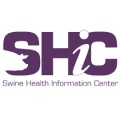 The Institute for Feed Education and Research (IFEEDER), Animal Nutrition Association of Canada (ANAC) and United Soybean Board (USB) have joined with the Swine Health Information Center (SHIC) to launch a research project that will evaluate several methods for cleaning and disinfecting feed mills following a potential African swine fever (ASF) outbreak. The information gained from the study’s results will inform North American feed industries’ ASF preparedness plans as well as feed mill biosecurity plans to minimize supply chain and trade disruptions in the event of an outbreak.
The Institute for Feed Education and Research (IFEEDER), Animal Nutrition Association of Canada (ANAC) and United Soybean Board (USB) have joined with the Swine Health Information Center (SHIC) to launch a research project that will evaluate several methods for cleaning and disinfecting feed mills following a potential African swine fever (ASF) outbreak. The information gained from the study’s results will inform North American feed industries’ ASF preparedness plans as well as feed mill biosecurity plans to minimize supply chain and trade disruptions in the event of an outbreak.
“SHIC continues to look into all routes of entry and dissemination of emerging diseases, not just to identify these pathways, but to do something about them with research of this kind,” said SHIC Executive Director Paul Sundberg, D.V.M., Ph.D., DACVPM. “With partnership across the allied feed-related groups to benefit the U.S. swine herd, SHIC is encouraged to see this project move forward. We have learned that once ASF virus is in a feed mill, it will remain in that environment for a long time. This work is essential to address this risk to the U.S. swine herd.”

The 12–18-month project will examine the optimal methods for disinfecting feed mills, paying particularly close attention to feed manufacturing equipment that is not designed for disinfection.
Researchers will test several disinfection and flushing procedures using three viruses known to be most stable in feed and endemic in the United States – Seneca Virus A (SVA), porcine
epidemic diarrhea virus (PEDv) and porcine reproductive and respiratory syndrome virus
(PRRSV). The project will also determine the infectivity of feed and environmental samples after completely flushing and decontaminating equipment.
The feed inoculation and manufacturing will occur in Kansas State University’s Cargill Feed
Safety Research Center, which includes a pilot-scale feed mill with pelleting capabilities and is approved for handling biosafety level 2 pathogens. Samples tested for infectivity will occur at Iowa State University.
“Over the past few years, the U.S. feed industry has taken steps to improve its biosecurity procedures to reduce the risk of ASF introduction and transmission at feed mills, such as voluntarily holding ingredients for extended periods and reducing foot-traffic onsite,” said Lara Moody, IFEEDER executive director. “Now, we are looking at filling knowledge gaps within the milling process – should an outbreak occur. There are currently no recommendations for best practices to clean and disinfect a feed manufacturing facility experiencing ASF contamination. With the support of American Feed Industry Association (AFIA) members, we are backing this research to provide guidance to companies to quickly and safely get their operations back up and running, minimizing any long-term shutdowns, which could have detrimental food supply chain and economic consequences.”
“The Canadian feed industry recognizes the devastating impact the introduction of ASF in North America would have on the swine industry,” said Melissa Dumont, ANAC’s executive director. "A strong biosecurity and supplier approval program is key to keeping animal diseases out of feed mills and these programs continue to evolve as the science evolves. However, if ASF were to be introduced in North America and enter feed mills, facilities are lacking the crucial information on how to decontaminate a feed mill. ANAC is excited to support this research project, which will provide critically important knowledge so we can adequately be prepared in the event of an outbreak and continue to provide all livestock with safe feed.
“The United Soybean Board has partnered with the swine and feed industries since 2015 to
ensure a long-term, sustainable and biosecure swine supply chain—including investment in
development of a risk-free ASFv surrogate, the investigation of feed mitigants, virus survival in transportation and virus survival during the feed milling process,” said Philip Good, USB’s
Demand Action Team chair and a Mississippi farmer. “Our collaborative investments help
ensure that the U.S. swine supply chain is prepared and able to minimize risk from foreign
animal diseases.”
January 25, 2022 - SHIC




